Photographs and memories
Local professional photographers convene, and catch up, at Commencement
Every Commencement at Harvard, the Yard fills with graduates and their families celebrating the completion of hard-earned degrees. But look closely in the front row, and you’ll see another jovial gathering. Press photographers from all over the region flock to the Yard to immortalize the regalia and traditions in Tercentenary Theatre. For the Boston press corps, noted for its collegiality, it’s a reunion of sorts — a chance to catch up while photographing some big names. After many years of recording the event, they all have their own favorite Commencement memories, and photos.
Bloomberg News freelance photographer Neal Hamberg has attended Harvard Commencements since 1981. “Harvard knows how to throw a party. It’s almost a carnival atmosphere,” he said. “You’ve got balloons. Everybody’s happy, and of course everybody’s happy. They’re graduating from Harvard!”
Neal Hamberg
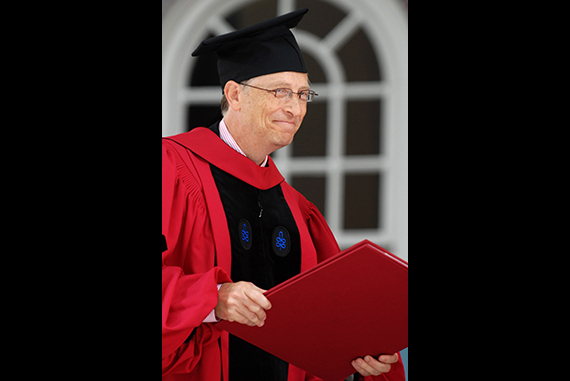
Microsoft founder Bill Gates returns to Harvard to collect his honorary degree. He urged the Class of 2007 to change the world for the millions of people who live in poverty and die of preventable diseases each year. Photo by Neal Hamberg/Bloomberg News

“All through the procession and when he was up on stage, he was just thrilled to be there and getting that degree,” Bloomberg photographer Neal Hamberg said of Bill Gates. Photo by Neal Hamberg/Bloomberg News

Bloomberg News freelance photographer Neal Hamberg is pictured in Harvard Yard. Photo by Stephanie Mitchell/Harvard Staff Photographer
Neal Hamberg
Associated Press staff photographer Elise Amendola has photographed the festivities since 1991. “What I love about the Commencement is the pomp and ceremony, and the fact that every year it’s the same thing, but it’s variations on the same theme,” she said.
There are the evergreen moments — the honorary degree recipient group photo in front of Massachusetts Hall, the procession past the John Harvard Statue, the Middlesex County sheriff in top hat and tails calling order to the Morning Exercises, the University Marshal presiding, and the University president overlooking the stage from the Holyoke Chair.
Elise Amendola
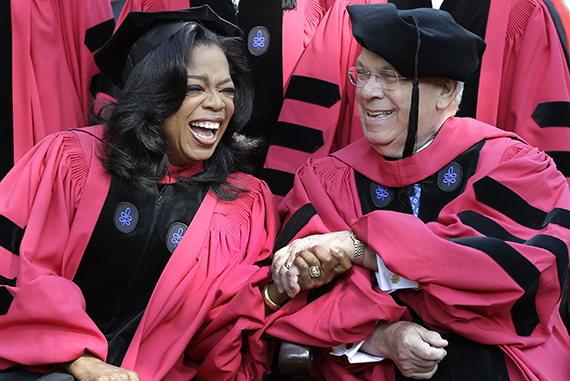
Oprah Winfrey clasps Boston Mayor Thomas Menino’s hand. Both received honorary degrees in 2013. Photo by Elise Amendola/AP Photo
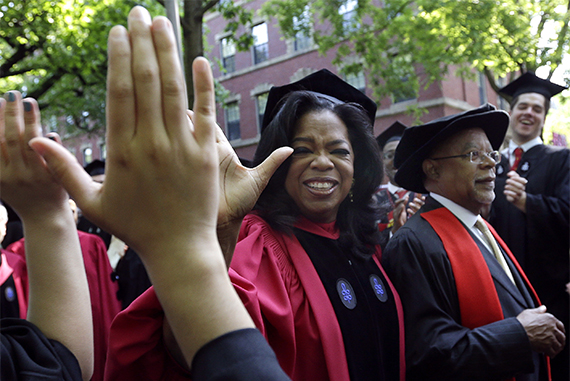
Oprah Winfrey high-fives graduates as she walks with Henry Louis Gates Jr. during the procession. Photo by Elise Amendola/AP Photo
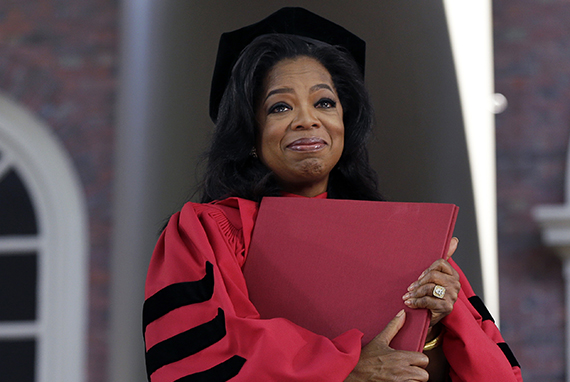
AP photographer Elise Amendola said Oprah Winfrey “was incredibly moved to receive an honorary degree. More so than I think I recall anybody else. And when she had the degree she clutched it to her chest and teared up. It just made for a beautiful picture.” Photo by Elise Amendola/AP Photo
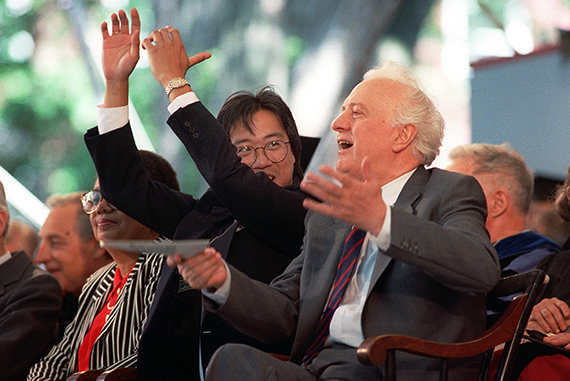
American cellist Yo-Yo Ma (left) shows Eduard Shevardnadze, former Soviet foreign minister, how to do the wave shortly before Commencement in 1991. The two honorary degree recipients react to the assembled graduates enjoying the festivities. Photo by Elise Amendola/AP Photo
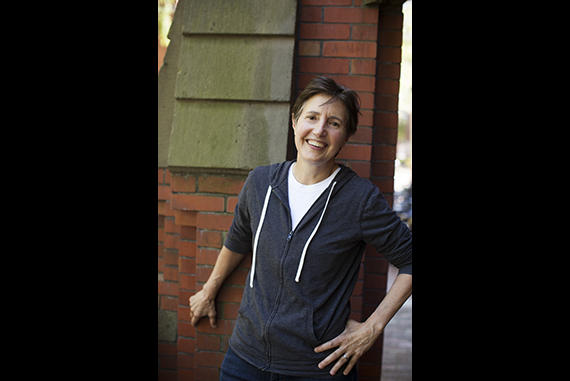
Associated Press photographer Elise Amendola is pictured in Harvard Yard. Photo by Stephanie Mitchell/Harvard Staff Photographer
Elise Amendola
“This wasn’t my first time at the rodeo,” said Boston Herald staff photographer Ted Fitzgerald, who has photographed Commencement since 1986 and has been in the business for almost 40 years. He noted the great visuals that come from the overall spirit of the day. As each School is announced, the graduates all raise symbols of their studies — the Law School yields gavels, the School of Education waves children’s books, and the Kennedy School throws inflatable globes. “You leave the Yard feeling good about what you have, as far as pictures go. You know that when you get back … they’ll be happy back there at the photo desk.”
And there are always surprises. The honorary degree recipients are always top-notch and their identities are kept under wraps until Commencement morning. It’s not uncommon to see a head of state, a Nobel laureate, even a movie star on the stage.
Ted Fitzgerald
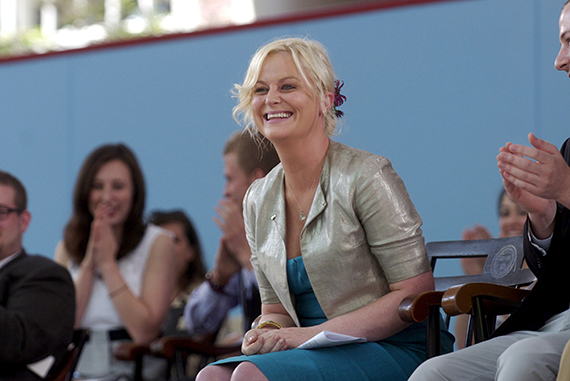
Amy Poehler delivers the Class Day address in 2011. Photo by Ted Fitzgerald/Boston Herald
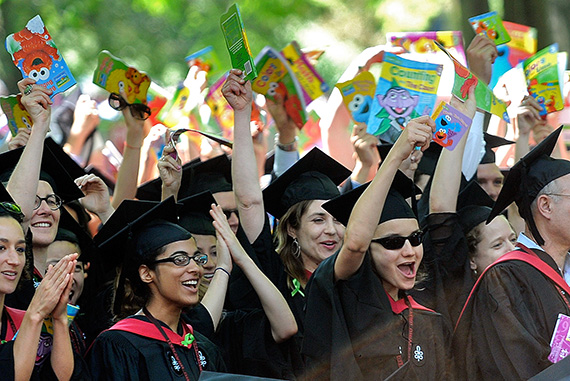
Harvard School of Education graduates celebrated by waving children’s books in 2011. “Harvard’s famous for those all-in-one good visuals,” said Boston Herald photographer Ted Fitzgerald. Photo by Ted Fitzgerald/Boston Herald
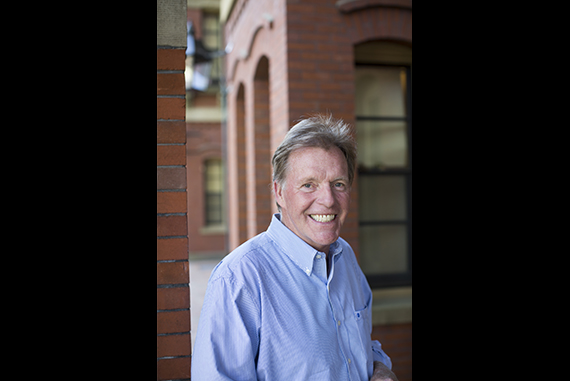
Boston Herald photographer Ted Fitzgerald is pictured in Harvard Yard. Photo by Stephanie Mitchell/Harvard Staff Photographer
Ted Fitzgerald
Reuters staff photographer Brian Snyder, who first arrived at a Harvard Commencement in 1989, remembered the surprising moment in 2011 when Plácido Domingo sang the degree conferral to fellow honorand Ruth Bader Ginsburg. The U.S. Supreme Court associate justice gave the tenor a heartfelt embrace.
The month of May is filled with commencements all over Cambridge and Boston, and experienced photographers are there every time, witnessing them all. Each ceremony has its traditions, but as Hamberg said: “Somehow it’s just not the same kind of atmosphere as you get in good old, historic Harvard Yard, with John Harvard looking down at you.”
Brian Snyder
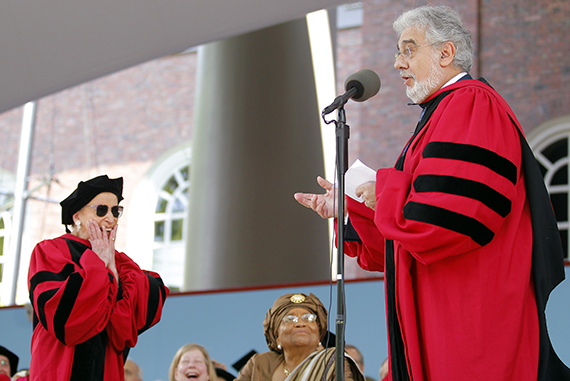
U.S. Supreme Court Associate Justice Ruth Bader Ginsburg (left) reacts as tenor Plácido Domingo sings a portion of the citation for Ginsburg’s honorary doctor of laws degree. Domingo was also honored during the 2011 ceremony, with an honorary doctor of music degree. Photo by Brian Snyder/Reuters
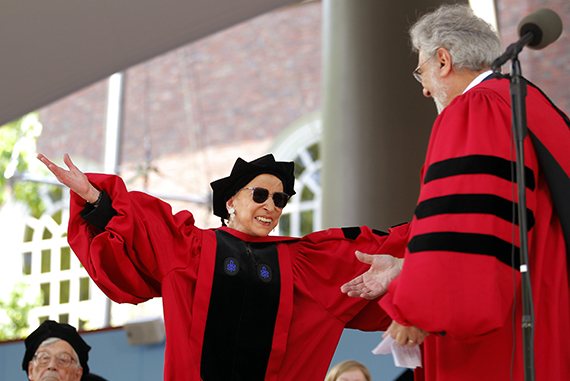
“This was truly an unplanned moment. He knew he was going to sing. She had no idea. And her reaction was really amazing. It was a real surprise for her,” Reuters photographer Brian Snyder said of Ruth Bader Ginsburg’s response to Plácido Domingo’s serenade. Photo by Brian Snyder/Reuters
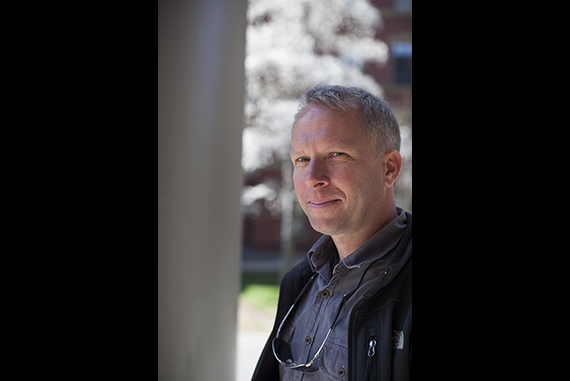
Reuters photographer Brian Snyder is pictured in Harvard Yard. Photo by Stephanie Mitchell/Harvard Staff Photographer




